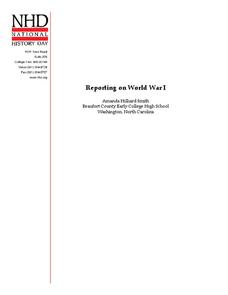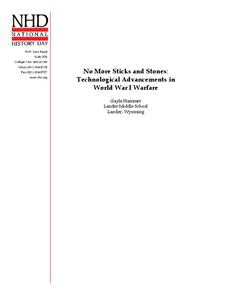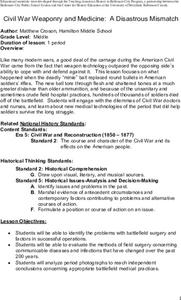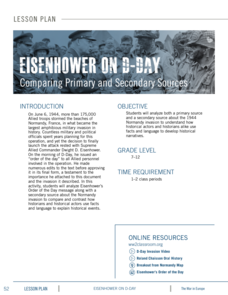City University of New York
Women's Suffrage and World War I
Democracy cannot exist where not everyone has equal rights. Discuss the state of democracy and women's suffrage during World War I with class discussions, debates, and primary source analysis, in order for class members to connect with...
Alabama Department of Archives and History
A Worse Death: War or Flu?
In a lesson that integrates history and mathematics, class members create graphs that compare military death statistics from World War I with those that resulted from the influenza pandemic of 1918.
National History Day
Reporting on World War I
Throughout history, newspapers have reported the events of the day as they unfolded. Using primary and secondary sources from World War I, scholars uncover how the American people learned of the events of the War to End All Wars. History...
University of California
The Civil War: Perspective
Confederate soldiers saw the Civil War much differently than their Union counterparts. Scholars analyze the perspective of the Civil War from the viewpoint of various key figures in the fourth installment of an eight-part series. By...
Syracuse University
Civil War
What was it like to enlist as a soldier in the Civil War? By using enlistment papers, young scholars consider this question. After they've looked at the primary source and discussed it, they create a short story of a fictional soldier to...
San José State University
Comparing/Contrasting
Do your students love movies? Use Star Wars and Indiana Jones to introduce the use of Venn diagrams for comparing and contrasting. A list of words to indicate comparison or contrast are also included to help with the writing process.
National History Day
No More Sticks and Stones: Technological Advancements in World War I Warfare
Remind young historians that many technological advancements influenced the events of World War I. After analyzing technology's evolution through primary sources, discussing the changes over time, and watching various video clips,...
National History Day
“War Is Hell. We Know it Now.” American Soldiers in the Meuse-Argonne Offensive
Understanding the soldier's experiences during World War I sometimes takes a newscast. Learners see the importance of understanding multiple points of view with a newscast project surrounding the Meuse-Argonne Offensive. Compare and...
National History Day
Propaganda Posters of World War I: Analyzing the Methods Behind the Images
The power of a picture. During the events surrounding World War I, propaganda posters were widely distributed in American society to sway the emotions of its citizens. By analyzing World War I propaganda posters in the first installment...
American Battlefield Trust
Contrasting the North and South Before the War
Fundamental differences between the North and South led to the South adopting a system of enslaved labor. These abstract ideas become concrete when class members create a standing cube using information provided in the resource. Young...
Roy Rosenzweig Center for History and New Media
War and Poetry
A band of brothers or the Devil's agents? Nobel warriors freeing the oppressed or mercenaries working for the military/industrial complex? Groups examine poems from the Civil War, World War I, and World War II to determine the poets'...
Curated OER
Poetry of The Great War: 'From Darkness to Light'?
Learners examine World War I poetry for historical context, poetic devices, and participate in a class discussion. They write an analysis of the poetry's form and its content.
Curated OER
Alice Liddel and The Looking Glass Wars
Fall down the rabbit hole of fantasy by comparing the stories Alice's Adventures in Wonderland and The Looking Glass Wars. This quiz asks questions about the real-life people and the characters that the stories are based on and comprised...
Curated OER
1864-1865: Bringing the War to an End
An interesting lesson plan explains the last battles of the war and the terms of the Articles of Surrender. It also analyzes the election of 1864 with copies of the Baltimore and Chicago platforms. To conclude the lesson, academics...
Curated OER
Post-1865: Effects of the War
An engaging lesson focuses on the impact of the war and Lincoln's plan for Reconstruction had on the United States. Historians analyze primary documents, such as Constitutional Amendments and newspaper experts. They also participate in...
Center for History Education
Civil War Weaponry and Medicine: A Disastrous Mismatch
Ironically, science was the reason why the Civil War was so deadly. Despite the use of medical practices now considered barbaric—such as conducting surgery with bare, dirty hands—developments in weaponry meant that more men died on and...
Alabama Department of Archives and History
World War II Home Front - Mobilization in Alabama
Ships, tanks, and planes—what does a military need to fight a war? An interesting instructional activity explains the government's military mobilization efforts in Alabama during WWII. Class members look at a PowerPoint presentation and...
Smithsonian Institution
Racism and Removal: Japanese Incarceration During World War II
During World War II people saw how far the government's control would go, but it was at the expense of its citizens. The resource brings the conditions of Japanese American internment camps to light using primary documents. Scholars...
Center for History Education
The Untold Story: The Black Struggle for Freedom during the Revolutionary War in Maryland
The American Revolution brought freedom to select groups and ignored others. An enlightening resource highlights the struggle of African Americans during the American Revolution and their efforts to escape slavery. Scholars analyze...
National WWII Museum
Eisenhower on D-Day: Comparing Primary and Secondary Sources
Dwight D. Eisenhower's message to troops for D-Day is iconic. Individuals examine Eisenhower's words and compare that to historians' understanding of the epic events of that day using primary sources, an essay, and a Venn diagram to...
Curated OER
Who Freed the Slaves During the Civil War?
Pose the question to your historians: who really freed the slaves? They critically assess various arguments, using primary sources as evidence. In small groups, scholars jigsaw 5 primary source documents (linked), and fill out an...
C3 Teachers
Uncle Tom’s Cabin: Can Words Lead to War?
"Words, words, words." Despite Hamlet's opinion, words can be significant. In this inquiry lesson, middle schoolers learn how the words in Harriet Beecher Stowe's Uncle Tom's Cabin, in the view of many, lead to the American Civil War. To...
Star Wars in the Classroom
"Shakespeare and Star Wars": Lesson Plan Day 1
"Now is the summer of our happiness/Made winter by this sudden, fierce attack!" Luke Skywalker meets Hamlet in a 10-lesson unit based on Ian Doescher's William Shakespeare's Star Wars: Verily, a New Hope. Using Star Wars® as source...
Curated OER
To War Or Not To War?
Seventh graders research the political, societal, and economic factors of World War I, World War II, and the 2001 war against terrorism. They participate in class discussions, write journal entries, and conduct Internet research. ...

























